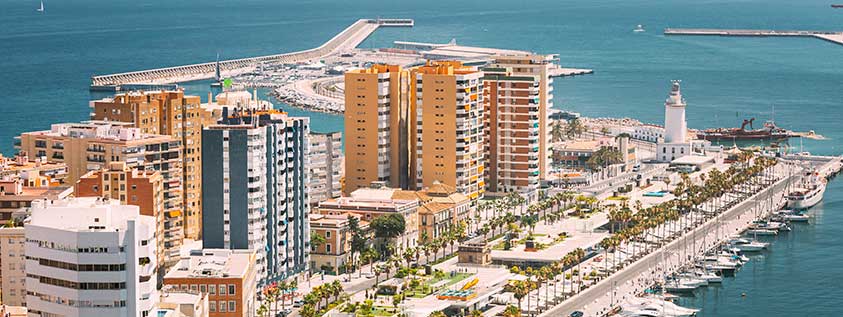Spain is the ideal place for foreigners from around the globe to start their own company. Excellent infrastructures, internationally renowned talent, and an entrepreneurial ecosystem make Spain a favoured choice. Having a business idea is great, but starting a business in Spain is not as easy as it sounds. In this guide, we discuss the most important steps and answer frequently asked questions. This guide will cover all you need to know, from the company formation to the accounting and bookkeeping.
The attraction for starting a business in Spain
Foreign investors and foreign companies that move to Spain want to expand in the attractive local market of Spain. Spain has an ideal landscape with incredible weather and an affordable lifestyle. Which makes it attractive for foreign investors to start a company and employees to work at. Spain’s business culture is liberal and very open to new opportunities, and foreign investments are always welcome.
So you are ready to take the leap and start a business in Spain. Whether you have made a business plan or want to extend your parent company with a local office. The steps you should take to successfully incorporate your company in Spain are tricky and not straightforward. This blog discusses the steps needed to set your company up properly and provide answers to FAQs. Read the following simple steps that will help you navigate through the process of starting your business in Spain. After covering the steps, we will discuss what kind of businesses are popular to start in Spain.
SpainDesk makes your company formation easy, fast, and worry-free

Apply NIE (Foreign Identification Number)
Whether you’re an EU citizen or a Non-EU citizen, you will need to obtain your unique Foreign Identification Number /Número de Identificación de Extranjero (NIE). A foreign identification number is one that every Spanish employer and a self-employed person needs. You can get your NIE at the Oficina de Extranjeros (Foreigners Office). This process may take up to two weeks, depending on which location you want to get it.
You can get the NIE number also through the consulate in your home country or the Spanish embassy. When you are dealing with a Spanish embassy, we recommend that you make a reservation for an appointment.
Usage of the NIE number
You need the NIE number to open a business bank account in Spain, get the company formation number (NIF or Numero de Identificación Fiscal), and open a corporate business entity. It also serves as your personal tax identification code and is needed to do your personal income tax return. Doing your personal tax return is obligatory in Spain, whether you’re a business owner or not. Besides that, you need it when dealing with any government authority. It is your identification code on all kinds of governmental and medical forms.
The NIE number differs from the NIF number, a company tax identification number. Starting a company in Spain requires you to get yourself an NIE number and then apply for a NIF (company tax ID) at your regional revenue office, called Agencia Tributaria.
The NIE format has ten characters, begins with a letter and ends with a letter.

Getting your NIF number (Tax number)
The Spanish NIF number is the equivalent of a Company’s Tax Number and is required to start paying taxes. The NIF number is necessary for the limited legal entities and not for the individual owner of the company.
To set up a company in Spain, after you get a NIE number you need a NIF number. The NIF number helps the tax authority identify your company for all kinds of tax purposes, such as paying corporate income tax. Corporate tax is payable by the company, not by its shareholders.
The first step to get it is gathering all your personal documents. These include your passport, ID card, and NIE number. Then you fill out a NIF request and present it to a local company registry office together with your personal documents.
The application process may take between one and two weeks, but some offices are faster than others. Make a copy of everything before handing it over; they usually want the originals back after checking them. You can bring your documents in person or by mail.
Getting the NIF through the embassy can be done at your nearest Spanish consulate. Make sure to make an appointment first before heading there. The process usually takes up to 15 days to submit all the necessary documents. Make sure that you have all documents required at hand. It doesn’t hurt to check beforehand if they are up to date.
The CIF number ‘Certificado de Identificacion Fiscal’ is another tax identification number, but the Spanish tax agency replaced it with the NIF number. You can both use a CIF or NIF number to pay tax.

Choosing the type of company you want to start
After getting your Spanish tax identification number, you must choose a business form. There are many different business structures you can choose from, and the Spanish legislation already becomes tricky here. There are two main categories. The first is for self-employed individuals, the second one is limited liability companies.
The general types of legal entity structures you can choose from in Spain are:
Business structures for individuals
- Sole trader – Empresario Individual (Autónomo)
- Joint owned company – Comunidad de Bienes
- Private partnership – Sociedad Civil Privada
Business structure for corporations
- Limited liability company – Sociedad Limitada (S. L)
- Public limited company – Sociedad Anónima (S. A)
- Worker-owned company – Sociedad Laboral
- Cooperative company – Sociedad Cooperativa
- General partnership – Sociedad Colectiva
- Limited partnership – Sociedad Comanditaria
Other unique types are
- Branch Office
- Private partnership – Sociedad Civil Privada
The Autónomo (self-employed worker) is the most straightforward legal regime for a sole trader or self-employed person. You will have the same liability as a natural person with this business form. It doesn’t have a minimum investment required, and you don’t need to prepare a balance sheet or an annual report. Therefore it is easier for you to deal with the Spanish tax authorities. It is mandatory for you to keep a registered book of all the issued invoices and a book of sales and income to collect all the invoices and income that you are issuing or receiving in the development of your activity. Also, if you do not have a residence permit in Spain, you can get a self-employed worker visa in some cases. In this case, though, you must show that one or more Spanish firms have signed up for your services.
The Sociedad Limitada (SL) entity is the most popular corporate legal entity for companies in Spain. The SL is also popular for foreign investors and as a parent company because of the limited liability. The company incorporation of the SL is complex and, therefore, involves a business lawyer. It has a minimum share capital investment of at least 3,000 euros. You can set it up with one single shareholder or several shareholders who all have unlimited personal liability if the company goes bankrupt. It is the go-to Spanish Limited Company.
Choosing your company name
After choosing your company’s name in Spain, it is necessary to check if someone has already used that name before. You can do this by going over all past and current trade names at the Commercial Registry (Registro Mercantil). Our service also includes this step, so you don’t have to worry about this. We only need you to think about four other possible company names. This is in case your first choice is taken.

Drafting the company’s Bylaws or Articles of Association
Think about this step if you incorporate a corporation, such as a Spanish SL. When you start a Limited Liability Company in Spain, it is required for you to have company Bylaws and Articles of Association.
This document collects the essential information that will govern the operation of a company. In other words, it will include all the rules applicable to your business. Your lawyer will draft the company’s Bylaws or Articles of Association in Spanish called the “Estatutos Sociales”. Once this document is ready, you will be given your company name of choice by the Mercantile Register, and you will invest the minimum capital share (if required). The company owners will sign the Bylaws and Articles of Association before the Spanish notary.
SpainDesk makes your company formation easy, fast, and worry-free
Get a certificate from the Spanish Mercantile Registry
Registering a company with the Spanish Mercantile Registry will get you your certificate so you can do all kinds of business activities in Spain. The digital certificate is created to verify identity using an ID card or passport. It is an online identification document that will allow you to carry out any procedures, including filling in the specific document and signing it, with the Spanish Tax Authorities over the Internet.
When you have registered the company, you will receive a copy of the public deed in which your name will be listed. This public deed is also called Memorandum of Association / Deed of Incorporation. It includes, amongst others, the company name, names of the shareholders, business activities, company objects and powers, for instance, who holds the manager/administrator charge in the company.
This will make it easier if you are ever asked who owns what part, especially when someone asks for money or wants to sell their share of the company. This could also be useful should there ever be any legal proceedings against the company.
As a foreigner, you have to register your company in the Commercial Registry (Registro Mercantil) within 30 days from its foundation. To do this, all shareholders living abroad need to get their copy of the public deed authenticated by a notary who is legalised by an Apostille or legalised with the Spanish Consulate where they live.
The Spanish Tax Authority
The Spanish tax agency can also get information from the Commercial Registry (Registro Mercantil). This means that they can easily determine how much you paid for your assets, who owns what percentage and other details about your business structure. They will also be able to see what type of legal entity it is, such as a sole trader, limited company or another form.
The local tax office will also see which taxes have been paid and when. This can come in handy if you ever get audited by the tax office because they would already know all your details – saving yourself time explaining how everything works from scratch.
Open a Spanish bank account
According to the law, opening a bank account isn’t strictly necessary when you start a business in Spain. However, in the specific case of the SL, for instance, to establish the company, it is required to invest a minimum capital share of EUR 3.000. Usually, you will put this share capital on a new business bank account. Also, it makes sense since it will be easier for you to analyse your results and manage your business. In general, you can’t easily navigate your day-to-day business activities without having a bank account. The bank will only request the certificate stating the company name to open it.
Having a Spanish business bank account gives you a better overview of your costs, revenue, profits, and tax payments. Furthermore, you can get help easier on your bookkeeping by linking your account to an accountant system.
If you are looking for a bank in Spain suitable for your company, we can assist you with the whole procedure. From choosing the right bank to setting up an appointment, we can make it as easy as possible for you.
Get a Spanish sim card or phone number
When you are coming from outside of Europe, it is smart to save costs by getting a Spanish sim card or phone number. This is useful for your business since you can save money on international calls. The Spanish mobile phone market offers prepaid sim cards, which are an easy way of getting a local number and keeping the costs low compared to having an office or renting one.
If you feel more comfortable owning your landline telephone, it might be better to get a fixed-line telephone service (Servicio de teléfono fijo). However, this will cost significantly more than just using pay as you go services such as Vodafone, Movistar, Orange and Yoigo offer. You can also get a discount deal by getting the internet connection simultaneously set up at your business premises. We can help you get your Spanish sim card or phone number as well, so you are set up properly right away.

Getting a postal address/register property at the authorities
The next step is choosing an official postal address. This will be where you get all correspondence and notifications, for instance, letters from the tax authorities. Your business premises can also serve as your postal address, a post office box is also okay. Don’t confuse the postal address with your business address, which is the ‘Domicilio Social’, the place where the main administration and operation is located, not just an address for notification purposes. You only find the ‘Domicilio Social’ in corporations, not with sole traders.
It is important to use the Spanish name of your company in the registered office address. Getting a registered postal address is essential for starting a business in Spain. Our experts are ready to provide you with a solution.
Filing your Tax Declarations, Forms and Annual reports
Whether you are a sole trader, limited company or have any other business form, you must fill in certain tax forms. Different regions in Spain have different tax laws and tax rates, and therefore we advise you always to consult an experienced company formation agent.
In general, sole traders (freelancers) have the following tax obligations
In general, limited companies have the following tax obligations
- Impuesto de Sociedades (IS) – Generally 25%
- VAT (IVA)
- Annual report (or ‘certificado de existencia y representación’ in Spanish)
- Different tax forms (i.e. importing products, renting, and buying property forms sometimes have to be filled)
At SpainDesk, we have a team of tax advisors offering a wide range of accounting services, including VAT registration, audit services, the preparation of the annual financial statements, and tax minimisation solutions. Our accountants can take care of the tax compliance in Spain for you.
Next to the tax obligations, there are also other forms (Modelo’s) that may need to be filled.

Set up an online accounting system at the start of your business in Spain
We can help you set up an online accounting system at the start of your business in Spain. Starting a company or opening a bank account without an idea of what’s going on in your finances is not only confusing but also risky and potentially costly for your business. Technology solutions have improved every aspect of bookkeeping. Businesses need an intelligent accounting solution that is fast and reliable.
By linking to our professional accounts team through cloud-based technology, we can make sure that you have one less thing to worry about during this important stage as well as provide more time to focus on growing your new Spanish enterprise while keeping track of all transactions and expenses.
Contact us to enjoy numerous benefits of our accounting solutions, including real-time reporting, access to an online accounting system, scan modules, and the latest financial information that aids business decisions. We can also offer you a very basic accounting and bookkeeping services package to get you started. We can understand that you don’t want to run up costs when you first start a business in Spain, which is why our basic services will provide you with the essential tax declarations and most basic guidelines that you need.
Commercial contracts for your business
There is a need of dealing with business contracts and conditions when starting a business in Spain. For your now existing company, the sales and purchase contract is probably the most important one. Contracts for providing services, leasing a property or buying a Spanish company are also very common in Spain. Other commercial contracts can be about providing certain services/ products or buying a company.
Drafting contracts
When dealing in the Spanish local market it is important that contracts are drafted in Spanish and checked carefully by a legal professional with experience in dealing with such business matters before they are finally signed.
At SpainDesk, we can prepare all types of commercial contracts and conditions for your Spanish company. We provide accurate advice that will protect your interests while maximising the benefits from the agreement throughout its period.
We have a wide range of services related to legal aspects in business matters, such as property transactions or employment law issues. Our team is always available to provide you with accurate advice and guidance to protect your interests in business matters, including commercial contracts. We will make sure that you are aware of the legal requirements of terms and conditions as well as any new clauses required by law.
Signing contracts
When you are not an expert, always seek legal advice before signing commercial contracts. It is important to have a Spanish legal professional review the contracts and conditions before they are signed. While it may seem like an unnecessary step, having someone look over your contract terms will help ensure that you do not miss any potential issues that could cause problems for both yourself as well as the other contracting party in future.
Next to this, we can also represent your company and sign contracts through the Power of Attorney. If you are the manager of a company in Spain but cannot sign contracts, we can help. The Power of Attorney is an important document that allows someone to perform certain acts on your behalf. Contact us today for more information about our services and benefits.

Payroll administration and management
When you want to have personnel working for you, you need a structured Spain payroll plan. You will have to make sure that everything is legally correct, and you meet the payroll requirements set by law. Payroll administration is defined by the Spanish government as a set of measures, processes and controls that the employer must ensure are followed with regards to salaries paid to employees.
As your company grows in Spain, you will be responsible for more people working for you than just yourself or other partners from time to time. Starting up a business is always challenging but having personnel on staff will certainly help.
Our payroll management in Spain will make sure your payroll-related activities are completed in a timely manner with as little disruption to business operations and resources as possible.
Spanish payroll administration services
Our lawyers, accounting, and recruitment experts are ready to assist you with the following services.
- Salary payments.
- Calculation of salaries and tax deductions.
- Preparation of payslips, including those in English or Spanish language.
- Creation of employment contracts.
- Timesheet calculation and management for employees that are required to hand in timesheets at the end of every month or week depending on their contract terms.
- Preparation, printing and mailing of reports.
- Payment of employers’ Social Security contributions.
If you would like to know more about our payroll management and services, please do not hesitate to contact us today for a free consultation. We provide guidance on the most suitable solution that meets your needs based on your company.
You will get an optimised solution for payroll management that helps your business run smoothly.A fully automated solution will ensure compliance in your payroll administration as well as management throughout the year, even if numbers change or new regulations are introduced during the year.

Social security management
Social security is an important aspect for people that work in Spain. If you or your employees work in Spain, you will have to be registered at the Spanish social security authorities.
Social security contributions are paid every month and paid by the employer. So in the case you own a business, you will need to pay contributions for your employees via their payslip.
At SpainDesk, we can help our clients every step of the way with their business. These steps include the payroll and social security part. We will ensure that social security payments are correct and that you know all the rules and regulations related to labour law. We offer a wide range of services in social security management for both companies and individuals, such as:
- Social Security registration in Spain
- Preparing and submitting Social Security declarations
- Calculating employers’ and employees’ Social Security rates to the corresponding Spanish Government Agencies.
SpainDesk will always keep you updated on the payments that should be made and prepare all necessary documentation for your employees’ social security, employers’ and personal contributions to Spanish authorities promptly matter.
You must register at the RETA as a freelancer and registered as an Autónomo. We can also help you with this registration and tell you which amount you need to pay.

Do you want assistance with starting your business?
With most of the above points, we can assist you. If you need more details about starting a business in Spain, you can contact SpainDesk. Our experienced team has an excellent record for concluding business agreements and contracts for foreigners to start in Spain.
Frequently asked questions
How much does it cost to start a business in Spain?
Our company formation services in Spain cost 1.500 euros and upwards. It depends on the type of company and services you need. This price includes all legal costs, administrative fees and accounting services like VAT registration, bookkeeping accountancy or audit service within a year. Starting a business in Spain doesn’t have to be expensive with us. Contact us, and we will give a price that fits your unique situation.
Starting a business in Spain takes approximately three months if you do it as an individual. You will need to be physically present, deal with the notary yourself, and fill out various legal forms. Starting a business by yourself is not easy, especially if your legal Spanish language skills aren’t good enough.
What do I need to pay when starting a business in Spain?
When you start a business in Spain, some legal costs are involved. These include the cost of registering a company in Spain and setting up an office space. Getting electricity, water, and an internet connection can also be expensive. As with every country on our planet, you have to pay business taxes when you have a business.
Can foreigners start a business in Spain?
Foreigners can start a business in Spain, and non-residents can also own a business. Business registration for non-residents can be more challenging and lengthy.
How long does it take to start a business in Spain?
The whole process of starting a business from scratch usually takes around three months. Starting a business in Spain as an individual can take up to six weeks because it takes time for you to receive your company’s number, which is called NIF/CIF (Número de Identificación Fiscal). While depending on the circumstances, starting a business with us will take around a month, and we will assist you with the whole process.
Is it easy to start a business in Spain?
Starting a business in Spain is easy as long as you have the right support. When speaking about the limited liability company, starting the business on your own can be very complicated and time-consuming because there is much to do. The paperwork you have to fill in will be in Spanish, but we can assist you with the whole process. Starting a business with our team makes the whole process much easier for you because we take care of all the legal steps and paperwork.
Is Spain a good place to start a business?
Spain is an attractive place to start a company. Starting a business in Spain is not only easy but also relatively cheap. The Spanish market has been growing for the past years and it becomes more international every day. Popular business industries in Spain are energy, IT and tourism. You can also find many businesses in the food industry, the automotive industry, clothing industry and real estate industry.
Do I need a business visa to have a company in Spain?
No, you don’t need a visa when starting a business in Spain. Yet, starting your own company is a way for foreigners to live and work legally in Spain. In any case, if you stay longer than three months in Spain, you need a visa. You can get a business visa within two weeks, and we will assist you with all of the administrative steps that have to be done correctly before opening your bank account.
As a foreign company, do I need to pay income tax?
Starting a company in Spain means paying taxes on profits if you are generating income from the Spanish market. When you are a foreign citizen and profit, you will also need to pay income tax.
What type of taxes do I need to pay when starting a business in Spain?
When registering a company, companies usually hire an accountant in Spain who will assist them during their first months (or years) of operation by preparing the monthly accounting reports required by law. Once your new company has been formed it’s automatically registered with tax authorities. You will then need to file your taxes and forms (Modelo’s). The type of taxes and forms you need to file depends on the type of business and your activities.

Do I need legal assistance when starting a company?
When starting a company it’s always recommended to get legal assistance. Starting a business in Spain can be done as an individual, but this requires understanding the process, which includes Spanish paperwork and legal documents. It requires a significant amount of due diligence on your part. It’s normal (for Spanish citizens) to get help with starting a business, so it is highly recommended for a foreigner.
It’s always recommended to get assistance when starting a company, especially when making a foreign investment. Next to helping with the company incorporation, it is also smart to get an accountant and bookkeeper involved and let them guide you in dealing with the Spanish Tax Office, or your local tax authority.
What are the benefits of the Spanish Limited Liability Company?
The Spanish limited liability company has the following main benefits:
- Limited Liability: Shareholders only can lose their investment
- Foreign Investors: Foreign investments can own 100% of the company
- One shareholder: The minimum of shareholders is one
- Low capital investment: The minimum share capital is 3.000 euros
- Flexible Management: The minimum number of administrators is one
What are the benefits of the Spanish Sole trader (Autonomo)?
The Spanish sole trader has the following main benefits:
- Low capital investment: The minimum share capital is 0 euros.
- Flexible Management: There is no minimum number of administrators. You only have to hire a bookkeeper who prepares your accounting reports at least once per year and sometimes an accountant/lawyer for advice on taxes and legal affairs.
- Deductibles on profit: You can deduct the costs of normal business activities such as telephone bills, office equipment, and supplies.
- Easy to set up: Starting a sole trader business in Spain is easy and quick, you can do it with a minimum of documentation.
- Social security coverage: Starting a business in Spain as a sole trader entitles you to social security coverage.
Where can I find my local tax office in Spain?
Tax administration in Spain is decentralised, and you can contact your local tax office for any questions or concerns. Regional tax offices in Spain are responsible for different aspects of taxation, such as SUMA offices in Alicante or ATC offices in Catalonia.
Do I need a business plan when starting a business in Spain?
It is not a legal requirement to register a company in Spain. However, starting a company without anything written down can result in a confusing situation and problems if something doesn’t go as expected.
Conclusion
Starting a business in Spain can be great. Spain has an interesting local market and expanding international business culture. The main business structure, the Limited Liability Company (SL) offers many benefits. These include that it can be run by any number of shareholders (including foreigners), with only one administrator, who must have less than 3.000 euros invested. Being a freelancer in Spain also has its perks: you’re not required to invest capital upfront or hire administrators; just make sure you get advice from lawyers and accountants when dealing with taxes and legal affairs.
At SpainDesk, we can help you for a fair price as your business advisors, business lawyers, bookkeepers and accountants in Spain. While we have explained a lot in this guide, we do recommend you waste any time and money figuring everything out yourself. We would love to help you get your company registered and provide you with all the necessary advice to run a successful business in Spain.
Disclaimer: Information on this page may be incomplete or outdated. Under no circumstances should the information listed be considered professional legal advice. We highly recommend seeking guidance from a legal expert if you lack extensive knowledge or experience dealing with any of the procedures outlined in these articles.
SpainDesk makes your company formation easy, fast, and worry-free

















































